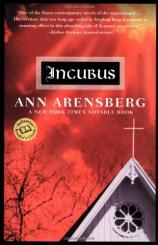Reading Group Guide
Discussion Questions
Incubus

1. At the very beginning of the book, Cora refers to what she sums up succinctly as the "basic needs--survival, nutrition, celebration." [p. 12] What part does each of these play, either by its presence or absence, in the unfolding of the plot and in the strangeness of what happens to the citizens of Dry Falls?
2. Also early on, Cora asks, "Did my love for the things of this earth bring on the trouble in the first place?" [p. 15] What do you think she means? What do you think of the way she has set up the idea of the townswomen and their female concerns as possibly the "unsuspecting magnet" for the visitations that occur? What relationship do you see to the famous witch trials of Salem?
3. How do you view the upending of ordinary life in Dry Falls? Do you think the idea that there have been supernatural occurrences can be a complete explanation? Ann Arensberg has spoken of the "eruptions of mysterious events into the lives of ordinary people." Are there possible parallels with anything you've ever experienced, in the way you've seen people behave when, suddenly, all normal rules seem to have been suspended?
4. In her reference to "hyperreality" in her conversation with Michele Slung, the author is echoing, however unconsciously, Shirley Jackson's memorable opening to The Haunting of Hill House: "No live organism can continue for long to exist sanely under conditions of absolute reality; even larks and katydids are supposed, by some, to dream." What does this mean? And how do madness and sanity fit into the events, the responses, and the personal transformations of Incubus?
5. Long before Stephen King and Shirley Jackson, New England had staked its claim to the basic territorial rights for what H.P. Lovecraft--who was himself a fine critic of supernatural literature, as well as being one of its most influential practitioners--has called the "heritage of American weirdness." Ann Arensberg speaks of her admiration for Nathaniel Hawthorne, for example. Can you think of other classic American writer who have used both the region and the uncanny in their work?
6. A different, equally useful thought comes from Dorothy L. Sayers, who was both a mystery writer and a scholar. She once expressed herself this way: "In nothing is individual fancy so varied and capricious as in its perceptions of the horrible. To one person [a story] is terrible beyond all imagination; to another, [it] is merely grotesque." Or, as Edith Wharton put it; "many a tale that turns another cold leaves me at a normal temperature." This is to say that reading fiction that intends, at the very least, to unnerve us is to be at the mercy of our own imaginative sensibilities. Do the happenings that Cora Lieber so carefully describes to us seem utterly appalling to you? Or are there readers among you who find yourselves unaffected by the mounting tension and unmoved by the ghastly invasions of the flesh and psyche on offer here?
7. General literary criticism also offers two ideas that present provocative topics for discussion here. One is Coleridge's notion of the "willing suspension of disbelief." He was writing in the nineteenth century; how does this apply, still, to what we read in the twenty-first? Another is the concept of the "unreliable narrator," which has been applied to works as disparate as Ford Madox Ford's The Good Soldier and Agatha Christie's The Murder of Roger Ackroyd. Do we take, then, everything Cora Lieber tells us in Incubus as straightforwardly accurate reporting? She doesn't seem at all disingenuous, but is there ever any place in her account of events where she might be imperfectly forthcoming?
8. Henry Lieber is a minister who goes from telling himself that the paranormal was merely an intellectual challenge like any other branch of learning, and in no way, " a serious rival to his vocation," to a very opposite stance. What do we learn about faith in this novel? Or, what do we learn about how the author regards issues of belief and practice? Is she more interested in good and evil, even reward and punishment, as they may stand separately from their traditional religious context? What about the spiritual challenges that are met--or unmet--by the various characters?
Incubus
- Publication Date: May 2, 2000
- Paperback: 336 pages
- Publisher: Ballantine Books
- ISBN-10: 0345438167
- ISBN-13: 9780345438164






